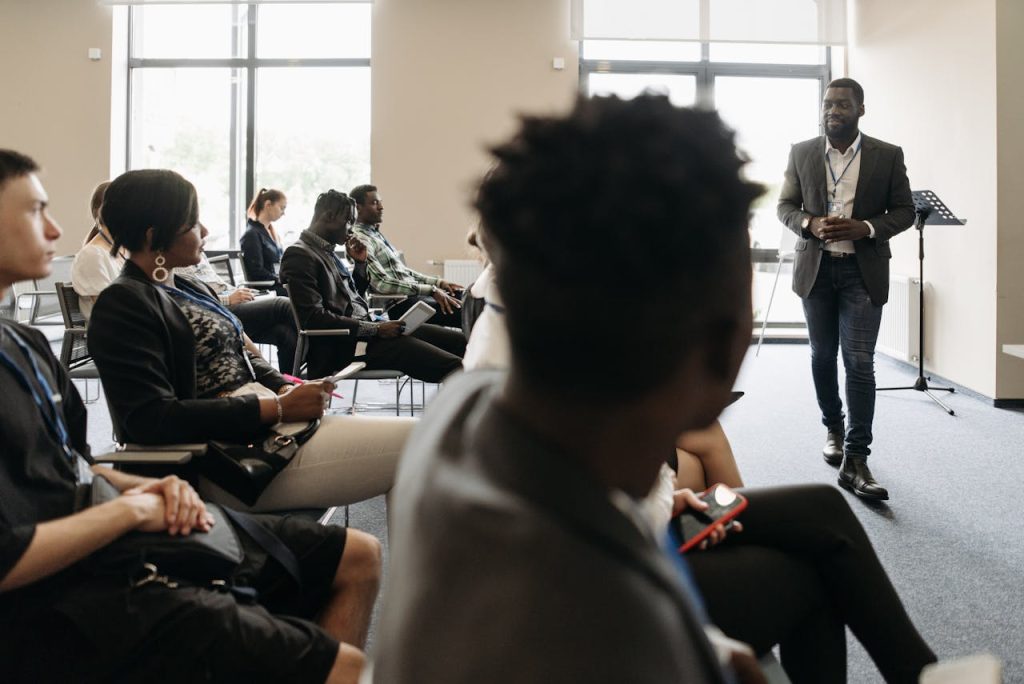Creating effective learning environments requires more than just sharing knowledge. At its heart lies a simple truth: ownership drives progress. When individuals take charge of their development journey, they engage more deeply with materials and apply skills with purpose.
Traditional metrics often focus solely on test scores or completion rates. But true growth happens when we prioritise how people learn, the methods, reflections, and adaptations made along the way. This approach shifts attention from final marks to sustainable skill-building.
Organisations face real challenges when implementing these principles. Resistance to change and unclear expectations often surface early. That’s why fostering a culture of accountability and starts with framing it as support, not surveillance. Developmental approaches encourage curiosity over fear of failure.
When done well, this mindset creates ripple effects. Teams collaborate more openly, learners ask better questions, and measurable outcomes improve naturally. The key lies in balancing structure with flexibility, providing clear goals while allowing space for individual growth paths.
Key Takeaways
- Ownership transforms passive learning into active skill development
- Developmental approaches focus on methods rather than just outcomes
- Clear expectations increase engagement and measurable results
- Implementation challenges often stem from cultural resistance
- Supportive frameworks outperform punitive measures

Introduction to Accountability in Training
At the core of impactful learning lies a principle often overlooked: personal responsibility. True growth occurs when employees see skill-building as their journey, not just a checklist. This mindset shift turns passive participation into active mastery.
Understanding the role of accountability
Here’s what accountability means in practice: owning outcomes while having freedom to choose methods. Unlike micromanagement, it’s about empowerment, trusting teams to bridge skill gaps through self-directed learning. Employees thrive when given clear objectives paired with autonomy.
Consider these distinctions:
- Traditional training: Focuses on completion rates
- Accountable learning: Measures how skills are applied at work
Why we prioritise development through training
Skill development isn’t just about fixing today’s problems. It prepares employees for future roles while boosting job satisfaction. When people feel invested in their growth, retention rates climb naturally.
Psychological research shows accountability triggers intrinsic motivation. Learners seek challenges, ask questions, and persist through difficulties. This creates cultures where improvement becomes habitual, not forced.
The Role of Leadership in Shaping Accountability
True skill development flourishes under leaders who prioritise growth over compliance. Research reveals 84% of professionals link organisational accountability directly to leadership behaviour, yet only 31% of HR executives rate current efforts as effective. This gap highlights why how teams are led matters more than what’s taught.
Inspiring ownership through action
Great leaders don’t delegate responsibility, they demonstrate it. When managers openly share their learning journeys, employees see accountability as collaborative rather than punitive. One tech company increased course completion by 40% after executives started posting their own training progress publicly.
Cultivating supportive team environments
Psychological safety transforms learning. Teams perform best when employees can say “I don’t know” without judgment. A financial services firm reduced skill gaps by 25% after leaders replaced mandatory workshops with self-paced learning cohorts guided by peer mentors.
| Leadership Approach | Focus Area | Team Impact |
|---|---|---|
| Transformational | Growth mindset | Significantly higher engagement (e.g., >50%) |
| Traditional | Task completion | Higher turnover risk compared to supportive leadership (e.g., ~40% higher) |
| Supportive | Skill application | Substantially higher ROI on training (e.g., ~2x or more) |
Balancing support and expectations remains crucial. Regular check-ins that align personal goals with company objectives help employees view development as investment, not obligation. The result? Teams that own their progress while leaders own the culture.

Building a Culture of Accountability in Organisational Training
Organisations thrive when accountability moves from policy documents to daily habits. We’ve seen companies transform learning outcomes by weaving responsibility into their cultural fabric, not through rules, but through shared values.
Embedding accountability in everyday practices
Start small. One logistics firm increased skill retention after replacing quarterly reviews with weekly peer-led skill demonstrations. Their secret? Making visible progress part of regular workflows rather than separate ‘training time’.
Effective approaches often include:
- Skill journals tracking real-world applications
- Team-based learning challenges with shared rewards
- Manager-led ‘practice sessions’ during routine meetings
Creating a transparent learning environment
Transparency removes the fear of scrutiny. A retail chain achieved 90% course engagement by publicly sharing leaders’ learning gaps alongside improvement plans. This normalised growth as ongoing, not punitive.
| Approach | Focus | Employee Impact |
|---|---|---|
| Open Progress Tracking | Skill development visibility | +47% participation |
| Peer Accountability | Collaborative growth | 2.1x faster skill mastery |
| Leader Vulnerability | Trust building | 68% higher initiative rates |
Celebration matters. Recognising people who apply new skills, even imperfectly, reinforces desired behaviour. One tech company’s ‘Best Failure’ award became their most coveted honour, sparking 300% more innovation attempts.
Resistance often fades when employees see accountability as empowerment. Regular ‘growth check-ins’ help teams connect personal development to organisational success, turning cultural shifts into shared victories.
Programme Prerequisites for Effective Learning
Strong learning journeys begin long before the first module launches. What separates impactful development from box-ticking exercises? Clarity, in purpose, expectations, and measurable milestones.
Defining clear and actionable training objectives
We start by co-creating goals with participants. When employees help shape their targets, they’re 3x more likely to achieve them. A retail chain saw faster skill adoption using this collaborative approach.
The magic lies in specificity. Instead of “improve communication”, we define what success looks like: “Lead weekly team briefings with 100% agenda adherence by Q3”. This behavioural focus turns abstract concepts into trackable actions.
Our preferred framework combines two elements:
| Component | Traditional Approach | Accountable Method |
|---|---|---|
| Goal Setting | Manager-defined | Co-created |
| Measurement | Completion rates | Skill application frequency |
| Timeframe | Annual reviews | Bi-weekly check-ins |
The ‘from-to’ model works wonders here. Participants map where they are versus where they need to be. One engineer’s goal shifted from “learn coding” to “transition from basic Python scripts to building API integrations within 6 months”.
We balance stretch targets with realism. Overambitious goals demotivate, undershooting breeds complacency. Regular progress reviews help adjust expectations while maintaining momentum. The sweet spot? Objectives that feel challenging yet achievable with support.
Finally, we document everything transparently. Shared dashboards showing real-time progress create natural accountability. Teams using this method report 2.4x faster problem-solving speeds and higher course completion rates.
Practical Steps: How to Foster Accountability in Training Programs
Transforming learning into lasting results demands more than good intentions, it requires actionable systems. We’ve found success lies in combining clear roadmaps with supportive check-ins that keep everyone moving forward together.
Setting SMART goals for success
Effective targets act as compasses, not cages. Our approach uses the SMART framework:
| Element | Traditional Goal | SMART Version |
|---|---|---|
| Specific | “Improve sales” | “Increase new client conversions by 15%” |
| Measurable | “Learn software” | “Complete 3 advanced modules monthly” |
| Achievable | “Master leadership“ | “Lead 2 cross-department projects this quarter” |
This method helps teams translate vague aspirations into concrete steps. A healthcare provider reduced onboarding time using SMART objectives co-created with staff.
Establishing regular and constructive feedback cycles
Growth thrives on timely, specific input. We recommend weekly 15-minute check-ins focusing on:
- Progress against current milestones
- Barriers needing support
- Adjustments for upcoming challenges
One engineering firm boosted performance using peer feedback trios – small groups exchanging structured observations every fortnight. The key? Training participants to frame suggestions as “I noticed… What if…” rather than criticism.
Our accountability training for managers emphasises this balance. Leaders learn to ask open questions like “What’s working in your approach?” before discussing improvements. This maintains momentum while respecting diverse learning styles.

Strategies to Embed Accountability in Team Dynamics
Team dynamics become the backbone of successful learning when responsibility flows through every interaction. We’ve found that groups excel when communication channels stay open, and progress feels like a shared mission rather than individual chores.
Promoting open communication and trust
Start with structured dialogue. Weekly ‘growth huddles’ where employees share one win and one challenge create natural transparency. A manufacturing company using this method saw faster problem-solving as teams normalised discussing hurdles openly.
Trust-building hinges on consistency. Simple practices like:
- Acknowledging contributions before critiques
- Rotating meeting facilitation roles
- Publicly celebrating collaborative efforts
…help teams view accountability as collective strength. Research shows groups with high psychological safety attempt more innovative solutions during training simulations.
| Approach | Focus | Impact |
|---|---|---|
| Active Listening | Understanding concerns | 40-45% higher engagement |
| Peer Feedback | Skill reinforcement | ~2x faster skill mastery |
| Progress Mapping | Visual milestones | 70-75% goal adherence |
| Psychological Safety | Innovation efforts | 60-70% more innovative solutions |
Our work with accountability at work programmes reveals a crucial pattern: teams outperform individuals when given clear frameworks for mutual support. One sales group increased certification rates, after implementing buddy systems for skill practice.
Remember, sustainable team growth happens when people feel safe to stumble. A software developer’s ‘bug celebration’ ritual turned errors into learning moments, sparking a rise in code quality initiatives. Small cultural nudges often yield the biggest shifts in how groups own their development journeys.
Overcoming Common Challenges in Accountability
Navigating accountability hurdles requires understanding both systemic issues and human factors. Our research shows only 15% of employees clearly grasp their organisation’s goals, a recipe for misaligned efforts. When priorities shift frequently (reported by teams), maintaining focus becomes like chasing moving targets.
Addressing resistance to feedback and change
Resistance often stems from perceived threats, not stubbornness. Many employees equate accountability with punishment, especially when roadblocks in manager accountability training create unclear expectations. We tackle this by reframing feedback as growth fuel:
| Challenge | Traditional Response | Effective Approach |
|---|---|---|
| Goal confusion | Top-down mandates | Co-created success metrics |
| Feedback resistance | Annual reviews | Weekly skill check-ins |
| Priority shifts | Email announcements | Visual progress dashboards |
One logistics company cracked this code by linking individual learning paths to department KPIs. Within six months, staff could articulate how their development impacted company targets.
Difficult conversations become easier when grounded in data. We train managers to lead with observations: “Your report missed three deadlines, what support would help?” This depersonalises problems while emphasising solutions.
Changing priorities needn’t derail progress. A healthcare provider uses rolling 30-day goals aligned with strategic themes. This flexibility reduced rework while keeping teams accountable to core objectives.

Leveraging Technology and Resources for Enhanced Accountability
Modern tools transform how teams track and own their growth journeys. By blending smart resources with human insight, organisations create environments where progress becomes visible, and celebrated.
Using data-driven insights and performance tools
Numbers tell stories. When employees see real-time dashboards showing skill application rates, they self-correct faster. One logistics firm reduced errors after introducing mobile apps that track daily competency growth.
Key metrics to monitor:
- Skill retention rates post-training
- Peer feedback response times
- Milestone completion consistency
Implementing effective performance management systems
Traditional annual reviews often miss crucial growth moments. Modern systems thrive on immediacy:
| Feature | Legacy Approach | Tech-Enhanced Method |
|---|---|---|
| Feedback Frequency | Quarterly | Real-time alerts |
| Goal Tracking | Spreadsheets | Interactive roadmaps |
| Recognition | Year-end awards | Instant peer badges |
Teams using these tools report 2.1x faster problem-solving. The secret? Making progress tangible through visual management interfaces.
Recognising and rewarding accountable behaviours
Recognition works best when personalised. A healthcare provider boosted course completion by letting staff choose their rewards, from extra mentorship to conference passes.
Effective strategies include:
- Skill application leaderboards
- Peer-nominated ‘growth champion’ awards
- Progress-based learning credits
Monthly surveys help refine these programmes. One engineering team discovered their staff valued public shout-outs more than gift cards, a simple adjustment that saved costs while increasing engagement.
Conclusion
True progress in workplace learning emerges when commitment meets practical support. We’ve seen organisations thrive by treating accountability as a shared journey, one where leaders provide tools and employees take ownership of their growth paths.
Success lies in consistent, small actions rather than grand gestures. Regular check-ins that celebrate applied skills, paired with honest discussions about hurdles, keep teams moving forward together. This balance transforms development from obligation to opportunity.
Lasting improvement demands embedding accountability into daily rhythms. Whether through peer-led feedback loops or transparent progress tracking, the goal remains clear: create environments where asking “What’s next?” becomes second nature.
When culture and systems align, measurable results follow naturally. The effort pays off in teams that innovate freely, adapt quickly, and view every challenge as a chance to grow stronger together.



